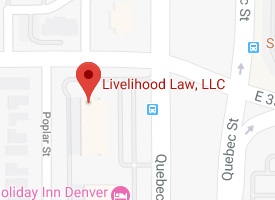Disability discrimination is treating an employee or job applicant differently because of a disability, perceived disability, or an association with a disabled person. Whether a person is visibly disabled or not, treating them differently or failing to make certain workplace accommodations is illegal. While disability discrimination claims have steadily declined over the last decade, people across the U.S. still filed more than 24,000 disability claims with the EEOC in 2019.
So, it’s good to understand your employment rights under federal and state legislation, including the Americans with Disabilities Act and the Colorado Anti-Discrimination Act.

Americans with Disabilities Act
The Americans with Disabilities Act of 1990 (ADA) makes it illegal for employers to discriminate against employees or those applying for employment because of a disability. See 42 U.S.C. § 12101, et seq. (2008). It prevents employers from discriminating against someone with a disability in all aspects of employment, including:
- Applications, interviews, and hiring;
- Compensation and benefit determinations;
- Employee discipline or suspensions;
- Harassment or hostile work environment;
- Promotions, reviews, and pay raises;
- Discharge or terminations; and
- Any other terms of employment.
The ADA also protects employees from employer retaliation for requesting a reasonable accommodation due to a disability.
What is a Disability?
The ADA and the Rehab Act define “disability” as:
- A physical or mental impairment that substantially limits a life activity. Life activities include“hearing, seeing, speaking, walking, breathing, performing manual tasks, caring for oneself, learning or working;”
- Having a record of such an impairment; or
- Being regarded as having an impairment.
Over the years, the courts have broadened the conditions that are disabilities under the law. Now, disabilities can include:
- Deafness;
- Blindness;
- Diabetes;
- Epilepsy;
- Intellectual Disabilities;
- Mobility impairments;
- Missing or partially missing limbs;
- Cancer;
- Asthma;
- Heart conditions;
- Lifting and back problems; and
- Mental health issues.
To be a “qualified individual with a disability,” a worker must be able to perform the essential functions of a job with or without reasonable accommodations. The essential functions of a job are the necessary duties and activities of the job position.
Who is Covered by the ADA?
The ADA applies to all employers with at least 15 employees, including federal, state, and local government employers, labor organizations, employment agencies, and private employers. The ADA only protects qualified workers with disabilities. A qualified worker is an individual who can perform the work with reasonable accommodations. The Rehabilitation Act of 1973 applies the ADA’s nondiscrimination standards to federal agencies, programs receiving federal financial aid, federal employment, and federal contractors’ employment practices.
What is a Reasonable Accommodation?
Federal and state laws also require that employers make reasonable accommodations that will allow a disabled employee to perform their job. Reasonable accommodations can include:
- Using technology or modified equipment;
- Accessible offices, bathrooms, and meeting rooms;
- Modified work schedules;
- Job reassignments or transfers to a vacant position;
- Modifying training and testing materials; and
- Periodic absences.
When requesting a reasonable accommodation, you should put your request in writing. Suppose your employer denies or ignores your request for a reasonable accommodation. In that case, you should consult an attorney to discuss whether to file a complaint with the U.S. Equal Employment Opportunity Commission (EEOC) or the Colorado Office of Civil Rights.
Colorado Anti-Discrimination Act
Colorado law also protects those with disabilities from discrimination in the workplace. The Colorado Anti-Discrimination Act (CADA) prevents discrimination because of an individual’s disability. Colorado’s law is broader than the federal ADA, applying to all employers regardless of the number of employees.
Filing a Disability Discrimination Claim
In many cases, you can file a disability discrimination claim with either the EEOC or the Colorado Civil Rights Division. Both agencies work collaboratively but have different deadlines and filing requirements. If you work for an employer with fewer than 15 employees, you may need to file with the Colorado Civil Rights Division. Moreover, you typically must exhaust your remedies with these agencies before you can file a lawsuit in court. It’s best to consult an attorney as soon as possible to ensure that you don’t miss any statutory deadlines, file with the correct agency, and submit the proper documentation for your claim.
Remedies Available for a Disability Discrimination Claim
Under both the ADA and the CADA, compensation for discrimination may include:
- Front and back pay, including interest on back pay;
- Reinstatement or hiring;
- Attorney’s fees and costs; and
- Punitive or liquidated damages for discriminatory acts based on “malice or reckless indifference” to your rights.
If you’ve faced disability discrimination at work, you should consult an experienced Colorado employment attorney to discuss your options and ensure you meet the statutory deadlines to file a complaint.
Race Discrimination
Racial discrimination in the workplace means treating an employee or job applicant unfavorably because of the person’s skin color, race, personal characteristics associated with a race like hair texture or facial features, or association with someone of another race or color. Race discrimination can occur even if both are of the same race, but it is still illegal. Today, many people like to think that racial discrimination in the workplace is no longer a problem. But the U.S. Equal Employment Opportunity Commission (EEOC) still received almost 24,000 race discrimination complaints in 2019.
In Colorado, employees have both federal and state protections from race discrimination in the workplace. You should understand your rights under federal and state law, including Title VII of the Civil Rights Act of 1964 and the Colorado Anti-Discrimination Act.
Title VII Protections
Title VII of the Civil Rights Act of 1964 prohibits race discrimination concerning any aspect of employment, including:
- Hiring;
- Firing;
- Pay and promotions;
- Layoffs;
- Training
- Job assignments;
- Fringe benefits; and
- Any other condition or term of employment.
See 42 U.S.C. § 2000e (1991).
Title VII also prohibits harassment because of a person’s race or color, including offensive remarks about a person’s race or color or displaying racially offensive symbols. Teasing doesn’t generally rise to the level of harassment under the law, but behavior that is so pervasive or frequent that it creates a hostile work environment does. Harassment that leads to adverse employment decisions is also illegal. The harasser can be a supervisor or co-worker, but it can also be someone who isn’t an employee, such as a customer or client.
Who Does Title VII Cover?
Title VII covers all public and private employers in the U.S. that have more than 15 employees. This coverage includes federal, state, and local governments, labor organizations, apprenticeship programs, and employment agencies. While the statute covers current and former employees, current and former job applicants, and trainees, Title VII doesn’t apply to independent contractors.
What is an Illegal Employment Policy?
In some cases, employment policies or rules that apply to everyone may violate Title VII if it harms employees of a certain race, isn’t related to the job, and isn’t necessary to business operations. An employer can also successfully defend disparate treatment if a characteristic is necessary for the job. For example, if a movie studio is filming a movie about George Washington, the studio may justify considering only people who appear to be white males for the job.
Colorado Anti-Discrimination Act
The Colorado Anti-Discrimination Act (CADA) prevents discrimination on a person’s sexual orientation, religion, disability, race, creed, color, sex, age, national origin, or ancestry. The CADA’s race discrimination prohibitions in the workplace also apply more broadly than Title VII. The CADA applies to all Colorado employers, not just those with 15 or more employees.
Filing a Racial Discrimination Claim
To file a complaint about racial discrimination, you may file with either the EEOC or the Colorado Civil Rights Division. The two agencies investigate and work collaboratively on discrimination claims. However, if you work for an employer with fewer than 15 employees, you may need to file your claim with the Colorado Civil Rights Division.
The EEOC and CCRD have differing statutory deadlines for filing claims. Under Title VII, you have 300 days to file a charge, while under the CADA, you have six months after the discriminatory act to file a charge. If you are a federal employee, you have 45 days to contact an EEO counselor. Either way, you must exhaust your remedies with these agencies before you can file a lawsuit for racial discrimination. It’s a good idea to consult an employment law attorney to ensure you file a complaint with the correct agency and within the statute of limitations.
Remedies Available for a Racial Discrimination Claim
Both Title VII and the CADA contain wide-ranging remedies for discrimination complaints to make the individual whole. Remedies may include:
- Back pay and interest;
- Front pay;
- Hiring or reinstatement;
- Attorney’s fees and costs; and
- Compensatory and punitive damages in cases of reckless or malicious acts of discrimination.
Federal law sets statutory caps for compensatory and punitive damages depending on the size of the employer:
- 15 to 100 employees: $50,000;
- 101 to 200 employees: $100,000;
- 201 to 500 employees: $200,000;
- More than 500 employees: $300,000.
If you’ve faced racial discrimination at work, you should consult an experienced employment law attorney as soon as possible to discuss your options and ensure that you meet the statutory deadlines to file a complaint.


